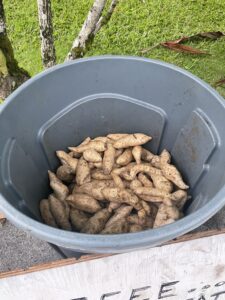

To the anonymous, generous individual who put out a bucket of free sweet potatoes that I ran into while walking around town one day: thanks for sharing this superfood with your neighbors!
All potatoes are not created equal. If I had to choose a dietary centerpiece, the sweet potato would be a major contender. In fact, the sweet potato was a staple food source in many traditional diets all over the world, including those in parts of Asia, Africa and the Americas.
In the traditional Okinawan diet, for example, over half of an individual’s daily calories came from sweet potatoes, which are filled with nutrients that manage inflammation and enhance immunity, including fiber, polyphenols, vitamins C/E/B6, and folate. They’re one of the best sources of beta-carotene–a precursor of vitamin A, which is especially important for immune health. In humans, sweet potatoes have been shown to decrease blood inflammatory markers.
Three tips on choosing and preparing potatoes of all kinds:
* Look for deep, intense colors
* Don’t ignore the peels, as they may be even more nutritious than the flesh
* After cooking your potatoes, chill them for 24 hours before reheating them or eating them cold. This enables the potatoes to develop more resistant starches and lowers their glycemic load
